Off the cuff is a new feature at The Immanent Frame, in which we pose a question to a handful of leading thinkers and ask for a brief response. Our question this week is about summer reading.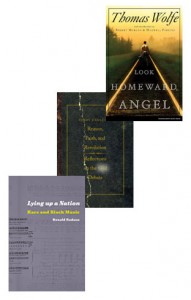
With the dog-days of August already at hand and the fall semester just around the corner, we’ve been curious about what our contributors have read these past few months. So we asked: What are the best books and essays you’ve come across this summer? What are you most looking forward to reading in the near future?
We have posted responses throughout the week. You can find previous responses here and here.
Nancy Levene, Associate Professor of Religious Studies, Indiana University, Bloomington
James K.A. Smith, Professor of Philosophy, Calvin College
Rudy Busto, Professor of Religious Studies, University of California, Santa Barbara
Jason Bivins, Associate Professor of Religious Studies and Associate Head of the Department of Philosophy and Religion, North Carolina State University
Webb Keane, Professor of Anthropology, University of Michigan, Ann Arbor
Omar M. McRoberts, Associate Professor of Sociology, University of Chicago
Justin Neuman, Assistant Professor of English, Yale University
Stathis Gourgouris, Director of the Institute of Comparative Literature and Society, Columbia University
______
 Nancy Levene, Associate Professor of Religious Studies, Indiana University, Bloomington
Nancy Levene, Associate Professor of Religious Studies, Indiana University, Bloomington
Summer reading! Badiou on the beach, sand in one’s Santner, parasols and paradoxes and political theologies—well, why not? I spent the summer on the road, not the beach, conscious that the imperatives of public life in microcosm are more elocutionary than literary. Still, I read, or re-sampled, two books that cry out for conversation, one way of imagining the anonymous “who” of recommendation. The first is Alain Badiou’s Polemics, which collects and translates essays on the topics of war (Iraq, Serbia), democracy and religion in France (e.g., headscarves), radical politics, and most compellingly, Badiou’s reflections on “the uses of the word ‘Jew.’” Badiou advances the claim that the use of the nomination ‘Jew’ to signify a community “of blood and soil, of race, of custom” is a betrayal of the word Jew, whose import is a universal one. Does this speak liberation theology or anti-Semite? Religious or secular manna? Does the very conjunction “blood, soil, race, custom” make him critical critic or owner of the means of obfuscation? Do his ends—universals—make sense in light of his analysis of history? The second is Foucault’s The Order of Things—right, not recent, not about secularism or religion or public life per se. But, not unlike the topical/philosophical Polemics, a book that tries to get inside—and outside—the mind of our categories, to traffic in thresholds and not simply meanings. I have been interested in this book’s own mind, its pervasiveness in the way we think about the transience of the public, the replacement of a zeitgeist, the identification of a past and a future, of an “our day” and a “theirs.” It is “soil,” not sand, that is “once more stirring” under our summer feet, Foucault suggests, and I wonder how seriously we do and have taken this prophecy.
______
 James K.A. Smith, Professor of Philosophy, Calvin College
James K.A. Smith, Professor of Philosophy, Calvin College
Summer is an opportunity to turn my reading habits away from professional obligations, though perhaps one never stops reading with those eyes. The highlight of my summer reading was finally poring through Thomas Wolfe’s Look Homeward, Angel (Scribner’s, 1929), a roller-coaster roman à clef which can be profitably read, I think, as an Augustinian parable. In contrast to the Presbyterian echoes of Wolfe’s North Carolina, Philip Roth’s first “Zuckerman” novel, Ghost Writer (FSG, 1979) raised issues about faith, criticism, and identity in quite a different place: post-Holocaust, American Judaism (with Isaac Babel hanging over the story).
On the poetry front, I enjoyed revisiting some favorites now included in Charles Wright’s latest collection, Sestets (FSG, 2009). While Wright’s poetry is persistently interested in debunking humanity’s significance, on the other hand there’s a certain enchantment to Wright’s “nature.” So in this respect, I think Wright is an interesting poet who challenges our habitual conceptions of “the secular.” I also read Carl Sandburg’s Selected Poems in the little collection edited by Paul Berman (LOA, 2006), and have been dipping into Raymond Carver’s All of Us: The Collected Poems (Vintage, 1996), despite being thoroughly annoyed by Tess Gallagher’s self-indulgent introduction.
For the fall, it’s back to the real world. I’m looking forward to a close reading of Eric Gregory’s important book, Politics and the Order of Love: An Augustinian Ethic of Democratic Citizenship (Chicago, 2008) in preparation for a panel at the American Academy of Religion in November. I’ll be doing the same with Graham Ward’s brash new volume, The Politics of Discipleship: Becoming Postmaterial Citizens (Baker Academic, 2009). And I’m leading a faculty reading group of J. Kameron Carter’s Race: A Theological Account (Oxford, 2008), which I anticipate will be provocative, maddening, and inspiring.
______
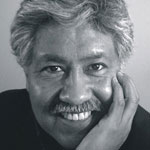 Rudy Busto, Professor of Religious Studies, University of California, Santa Barbara
Rudy Busto, Professor of Religious Studies, University of California, Santa Barbara
Adam Roberts’s History of Science Fiction (Palgrave, 2007) provides a fascinating and important alternate history of the “west” through the dynamic struggle between the materialist/rationalist and imaginative/spiritual impulses. Science Fiction will be one of the next critical idioms in the study of religion, and Roberts has a clear beat on it. Roberto Goizueta’s Caminemos con Jesus: Towards a Theology of Accompaniment (Orbis, 1995): a challenge to Anglo/North Atlantic modes of theology focusing on the lives of everyday Mexican Americans in San Antonio. One of the touchstones for the writing of contemporary Latinate theologies. Carol B. Duncan’s This Spot of Ground: Spiritual Baptists in Toronto (Wilfred Laurier, 2008) is fresh reading of Black religion in Canada, applying solid social science research with a careful ear to what believers in this Caribbean religious tradition say about their faith and place in “multicultural” Canada.
______
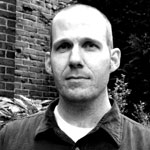 Jason Bivins, Associate Professor of Religious Studies and Associate Head of the Department of Philosophy and Religion, North Carolina State University
Jason Bivins, Associate Professor of Religious Studies and Associate Head of the Department of Philosophy and Religion, North Carolina State University
Here in North Carolina, our Fall semester has already begun. As I get reacquainted with the classroom and with my colleagues, I look back contentedly on a relaxing summer of reading and—what’s almost of greater interest to me these days—re-reading. Though I told myself I would look away from the spaces of doom-shouting that have preoccupied me in recent years, I’d be lying if I failed to admit that I spent a vast amount of time this summer watching and listening to (and reading about) the acrimonious health care “debates,” and their related spectacles and fearful imaginings.
More productive (and less stressful) was my reengagement with two consistently stimulating texts: Tracy Fessenden’s Culture and Redemption and Ronald Radano’s Lying Up a Nation. As my current research turns to music, performance, and rituals of resistance in American jazz traditions, these books—both investigating mutable traditions of American self-imagination in expressive cultures—help me think through the relation between the American habits of self-understanding (always at the intersection of self-creation and constraints narrative and cultural) and the interpretive traditions that have paralleled, facilitated, obstructed these attempts.
Fessenden’s study of the mutual imbrication of Christianities and secularisms in American literature documents the challenges of dissent from the basic grammars of American self-understanding. Where Fessenden focuses on the narrative construction of particular Americas, particular publics, and particular secularisms, Radano’s book teases out the construction of particular modes of citizenship and cultural belonging through historic delineations and circumscriptions of black musical expression. He describes the “lie” often accruing to black music, a focus on “soul,” “depth of feeling,” or “religious energy” that has been used to characterize forms ranging from field shouts to early “jass” to R & B and beyond. By situating the efforts of mostly white interpreters to “fix” and frame such music, Radano shows how these interpretations—built on enduring preconceptions about religion and performance in public life—have strengthened prevailing racial logics as well as expectations about the taming of “enthusiasms” in public life. I’ve found it really enriching to put these texts in conversation, thinking through the meanings made of “religion” in American expressive cultures, its definitions and accepted contours made and remade in those multiple spaces where freedom and constraint name one another.
______
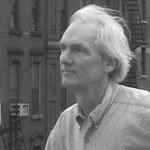 Webb Keane, Professor of Anthropology, University of Michigan, Ann Arbor
Webb Keane, Professor of Anthropology, University of Michigan, Ann Arbor
I have just finished reading Barbara Herrnstein Smith’s Natural Reflections: Human Cognition at the Nexus of Science and Religion (forthcoming this fall from Yale University Press), which derives from her 2006 Terry Lectures. It takes on some of the most visible protagonists in the science versus religion quarrel, focusing, on the one hand, on attempts to use evolutionary psychology to “explain religion,” and, on the other, efforts within what she dubs “The New Natural Theology” to encompass or rationalize Darwinian science. It’s an unequal battle, and she devotes more of her attention to the former, whom she takes to pose a more challenging set of claims, and to be working with what appears, even to a critic, to be a more coherent model. The book is useful for a number of reasons. Perhaps foremost, for followers of the Immanent Frame, it provides a generous, thoughtful, and clear summation of the major arguments and their rebuttals. Although Smith’s own position is never in question, she makes an admirable effort to be even-handed and to learn what is useful from those she criticizes. Secularism as such is not precisely her topic, but the way she frames the argument is of direct relevance to how the case for secularism—as an epistemological ethic, if not a political mandate—has often been made. She draws on both Two Cultures sociology and the psychology of cognitive dissonance to show parallels in the nature of the arguments on each side, but wisely resists any temptation to put these parallels to the service of tendentious apologetics or tu quoque (in the vernacular, “Your mother too!”) dismissals. Rather, she brings them out in order to make a case for reflexivity and against methodological purism and explanatory triumphalism.
______
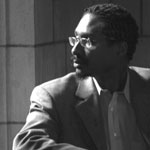 Omar M. McRoberts, Associate Professor of Sociology, University of Chicago
Omar M. McRoberts, Associate Professor of Sociology, University of Chicago
The Civic Life of American Religion. Edited by Paul Lichterman & Brady Potts. Stanford, CA: Stanford University Press, 2009.
Your Spirits Walk Beside Us: The Politics of Black Religion. Barbara Dianne Savage. Cambridge, MA: Belknap, 2008.
Garveyism as a Religious Movement. Randall K. Burkett. Metuchen, NJ: Scarecrow Press, Inc., 1978.
God and the Welfare State. Lew Daly. Cambridge, MA: MIT Press, 2006.
W.E.B. DuBois, American Prophet. Edward J. Blum. Philadelphia: University of Pennsilvania Press, 2007.
Politics as Religion. Emilio Gentile. Princeton, NJ: Princeton University Press, 2001.
______
 Justin Neuman, Assistant Professor of English, Yale University
Justin Neuman, Assistant Professor of English, Yale University
My vote for the most engaging book on the subject of religion and secularism published in so far in 2009 is Terry Eagleton’s Reason, Faith, and Revolution: Reflections on the God Debate. Written for public recitation in the Dwight H. Terry Lecture series at Yale University, which invites scholars to reflect on science, religion, and human welfare, Eagleton’s book surges with energy and wit. Part invective against the evangelical atheisms of writers like Christopher Hitchens and Richard Dawkins, Eagleton takes contemporary atheists to task for the shoddy state of their theological understanding, focusing primarily on the reduction whereby critics of religion view a complex life-world primarily as an outdated form of science. To see religion as “a botched attempt to explain the world,” he writes, “is like seeing ballet as a botched attempt to run for a bus” (50). While fighting inadequate secularization theory with one hand, Eagleton fashions a curiously compelling picture of Christian faith with the other. Wrapping his theological musings in a modest package (he calls his account of Christianity “thoroughly orthodox, scriptural, and traditional”), Eagleton reclaims Christianity from the Christian right. In a set of inversions Žižek would admire, Eagleton shatters any complacency in Christianity: “If you follow Jesus and don’t end up dead, it appears you have some explaining to do” (27). God is not omniscient creator but pointless aesthete, an artist who made the world “for the hell of it” (8). More importantly, Eagleton is drawn to the radical and socially progressive impulses of a Christianity that finds “the only authentic image of [its] violently loving God…[in] a tortured and executed political criminal, who dies in an act of solidarity with…the destitute and dispossessed” (23). Compulsively readable and politically timely, Eagleton’s book cuts the religion/secularism binary with the sharp edge of humor.
______
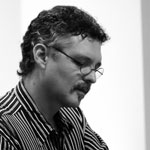 Stathis Gourgouris, Director of the Institute of Comparative Literature and Society, Columbia University
Stathis Gourgouris, Director of the Institute of Comparative Literature and Society, Columbia University
The summit in summer reading for me is reading Greek newspapers, two per day, four on Sundays. I don’t know why I do this—I can hardly get through the NY Times with any sort of regularity. But these maculate figures of daily news are, in innumerable ways, the epitome of secular pleasure. Even when they bear ill tidings, or convey profoundly depressing facets of human behavior, they are nonetheless replete with that wondrous sense of the ephemeral, the incidental, the outrageous, the mundane. I’m a lover of the leisure of literature and there is surely plenty of that in reading Greek newspapers in the shadow of a fig tree during a hot afternoon after lunch and before siesta.
Sunset time, between the evening swim and a drink at the bar on the beach, invites the sort of reading whose pleasure lies in uncovering the various dead-ends in one’s thought. Such was the experience of reading Cornelius Castoriadis’ Fenêtre sur le Chaos (2007), a collection of writings on humanity’s artistic capacity, especially in poetry and music, which includes a couple of brilliant interviews and a long and previously unpublished section of one of his notorious seminars at the Ecole des Hautes Etudes en Sciences Sociales. This book brims with Castoriadis’ inimitable panache for straight-shooting at whatever feigns mysteriosity, and it includes some memorable pages on the abyssal physis that instigates the imaginary of the sacred.
Another such book was Humberto Maturana and Francisco Varela’s classic Autopoiesis and Cognition: The Realization of the Living (1972), a work that launched so-called new biology studies. What’s remarkable about this book is not only that it conceptualizes how an organism is, at an elemental level, the force of self-creation, but that this force itself—as living being—is an epistemological condition. Even more, the brilliant writing brings out the exhilaration of encountering a truly literary sensibility.
Aspirations of future reading are best not to be communicated, I’m afraid. Their realization falls far short of one’s expressed appetite.












